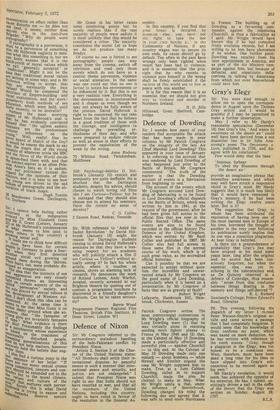Gray's Elegy
Sir: You were kind enough to allow me to open the correspondence in August upon the Thomas Gray article and I would be grateful if I may be permitted to make a further observation.
May I refer to Mr Hardy's reasonable speculation (December 18) that Gray's line, 'And waste its sweetness on the desert air' could well have been derived from a not dissimilar line in Dr John Armstrong's poem The Oeconomy o Love, published in 1736, and disagree with his conclusion?
Few would deny that the lines 'Impious, forbear To shed thy Blossoms through the desert air' provide an imaginative phrase that intensifies awareness and which may well have struck a responsive chord in Gray's mind. Mr Hardy suggests that it is much less likely that it would have remained in Gray's memory if he had been writing the Elegy twelve years later. But is it?
The suggestion that Gray, to whom has been attributed the reputation of having been one of the most learned men in Europe of his time, borrowed the thought of another in the very year following its publication surely implies that its use was a conscious plagiarism. At best Gray is belittled.
Is there not a preponderance of probability that Gray's line may have erupted in his mind some years later, long after the original and its source had been consciously forgotten, but when the essential idea was yet reechoing in the subconscious and, as De Quincey observed in a defence of Coleridge, thus reasonably "arose from that confusion between things floating in the memory and things self-derived "?
R. L. Rickard Gowland's Cottage, Prince Edward's Road, Gibraltar










































 Previous page
Previous page